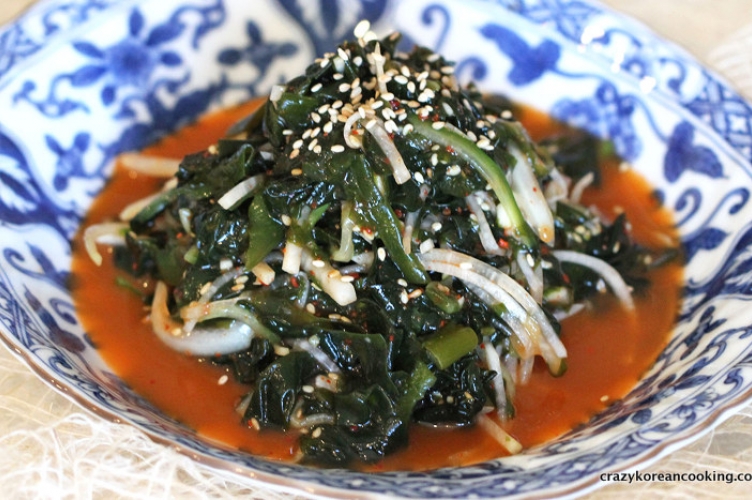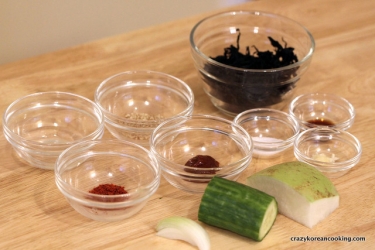Seaweed Salad - Spicy Version, Miyeok Muchim
미역무침

Miyeok muchim (seaweed salad) is great when you are craving for something refreshing that will boost your appetite. A perfect trio: soft miyeok, crunchy radish and succulent cucumber, dressed with a sweet and sour vinaigrette is indeed invigorating to your taste buds. Miyeok muchim is traditionally served as one of the side dishes that complement rice for any meals but it can surely be a great appetizer as well. This recipe is a spicy version.
Miyeok is considered to be one of the super foods even in North America even though it's not in the normal American diet. It is a great source of calcium, iodine, fibre, omega acids, vitamin B1 & B3, while low in calorie. People believe that its health benefits are infinite: metabolism regulation, blood purification, constipation relief, detoxification, anti-carcinogen, anti-aging etc. For this reason, Korean women eat Miyeokguk (seaweed soup) after giving birth. They say this tradition started in the Goryeo Dynasty when people observed whales eating miyeok after giving birth (believe it or not).
You can buy Miyeok Muchim ingredients online here.
Miyeok muchim (seaweed salad) is great when you are craving for something refreshing that will boost your appetite. A perfect trio: soft miyeok, crunchy radish and succulent cucumber, dressed with a sweet and sour vinaigrette is indeed invigorating to your taste buds. Miyeok muchim is traditionally served as one of the side dishes that complement rice for any meals but it can surely be a great appetizer as well. This recipe is a spicy version.
Miyeok is considered to be one of the super foods even in North America even though it's not in the normal American diet. It is a great source of calcium, iodine, fibre, omega acids, vitamin B1 & B3, while low in calorie. People believe that its health benefits are infinite: metabolism regulation, blood purification, constipation relief, detoxification, anti-carcinogen, anti-aging etc. For this reason, Korean women eat Miyeokguk (seaweed soup) after giving birth. They say this tradition started in the Goryeo Dynasty when people observed whales eating miyeok after giving birth (believe it or not).
You can buy Miyeok Muchim ingredients online here.
INGREDIENTS
shop these ingredients online »| ½ oz | Sea Mustard (Miyeok or Brown Seaweed) 미역 (dried) | |
| ⅛ | Cucumber 오이 (about 70g) | |
| 1 oz | Korean Radish 무 (Korea radish preferred but can use western radish) | |
| ⅛ | Onion (Medium) 양파 | |
| ¼ tsp | Garlic (minced) 다진 마늘 | |
| ¼ tsp | Salt 소금 (may need less or more depending on the brand) | |
| 1 tbs | Vinegar 식초 | |
| 2 tsp | Sugar 설탕 | |
| ¼ tsp | Soy Sauce for Soup (Gukganjang) 국간장 (optional, use regular soy sauce or add more salt) | |
| 1 tsp | Sesame Seeds 깨 (optional) | |
| ½ tsp | Gochujang (Hot Pepper Paste) 고추장 | |
| ¼ tsp | Gochugaru, Korean Hot Pepper Flakes 고춧가루 (optional) |

Optional Ingredients and Substitutions
Dried miyeok: Depending on how dry the miyeok is, the amount of dried miyeok needed may vary. For dried "pre-cut" miyeok, you may need less because it increases more in volume than regular dried miyeok when soaked. After soaking for 30 minutes, it should be about 1½ cups for 2 servings (can be 4 servings if there are many other side dishes for the meal). However, you can add more miyeok if you love it.
Soy Sauce for Soup (Gook Gan Jan): You can use regular soy sauce or just add more salt.
Radish: Korean radish is best for this dish. But, if you cannot get it, use a western radish.
Sesame seeds: Can be omitted.
Gochujang & gochugaru: You can use a mix of both or either one. Gochujang (red chili paste) has sweetness and saltiness to it. So, if you are using more gochujang (red chili paste) and no gochugaru (red chili flakes), you may want to reduce the amount of salt or sugar. Depending on the spiciness you want, you can vary the amounts.
More questions? Please leave your questions below in the comment section. We will do our best to answer as soon as we can.
instructions |
photos |
summary |
|---|---|---|
Ingredient amounts in the recipe instructions are for the default serving size. |
Click to enlarge photos. |
Ingredient amounts in the recipe summary are for the default serving size. |
1. Soak dried miyeokSoak 15g of dried miyeok in water for at least 30 min. You want to have about 1½ cup of miyeok when it is fully soaked and drained. |
1
Soak
| |
2. Rinse and drainRinse miyeok thoroughly twice and drain. Cut into about 2 inches length if it’s not pre-cut. (You can cut into whatever length you prefer.) |
2
Rinse miyeok twice Drain Cut 2” | |
3. Boil water (optional)Bring 6 cups of water tp boil on high heat. |
3
Bring to boil
| |
4. Prepare radishPeel, wash and julienne radish into thin 1½” (or 4 cm) long pieces. |
4
Peel & wash radish Julienne
| |
5. Prepare cucumberWash and julienne cucumber into thin 1½” (or 4 cm) long pieces. |
5
Wash cucumber Julienne
| |
6. Prepare onionPeel & julienne onion |
6
Peel and julienne ¼ onion. | |
7. Blanch miyeok (optional)Blanch miyeok in boiling water for 10 min. You can skip blanching and use raw miyeok but the texture will not be as soft. If you are using raw miyeok, make sure it is soaked until soft enough to eat it. |
7
Blanch miyeok High Heat | |
8. Rinse & drainRinse in cold water and squeeze water out by hand. |
8
Rinse Squeeze water out | |
9. Make seasoningIn a bowl, mix ½ teaspoon of minced garlic, ½ teaspoon of salt, 2 tablespoons of vinegar, 4 teaspoons of sugar, ½ teaspoon of gukganjang (or regular soy sauce), 1 teaspoon of gochujang (red chili paste), ½ teaspoon of gochugaru (red chili flakes) and 2 teaspoon of sesame seeds. |
9
| |
10. Mix seasoningGently mix miyeok and all vegetables with the seasoning. |
10
Gently mix all | |
11. ServeServe on a side dish plate. You can sprinkle more sesame seeds as a garnish if you like. |
11
Serve Sprinkle sesame seeds |












 30 min
30 min